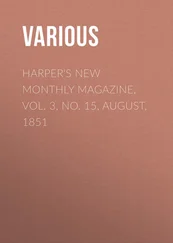Various - Harper's New Monthly Magazine, Vol. V, No. XXV, June, 1852
Здесь есть возможность читать онлайн «Various - Harper's New Monthly Magazine, Vol. V, No. XXV, June, 1852» — ознакомительный отрывок электронной книги совершенно бесплатно, а после прочтения отрывка купить полную версию. В некоторых случаях можно слушать аудио, скачать через торрент в формате fb2 и присутствует краткое содержание. Издательство: Иностранный паблик, Жанр: periodic, foreign_edu, на английском языке. Описание произведения, (предисловие) а так же отзывы посетителей доступны на портале библиотеки ЛибКат.
- Название:Harper's New Monthly Magazine, Vol. V, No. XXV, June, 1852
- Автор:
- Издательство:Иностранный паблик
- Жанр:
- Год:неизвестен
- ISBN:нет данных
- Рейтинг книги:5 / 5. Голосов: 1
-
Избранное:Добавить в избранное
- Отзывы:
-
Ваша оценка:
- 100
- 1
- 2
- 3
- 4
- 5
Harper's New Monthly Magazine, Vol. V, No. XXV, June, 1852: краткое содержание, описание и аннотация
Предлагаем к чтению аннотацию, описание, краткое содержание или предисловие (зависит от того, что написал сам автор книги «Harper's New Monthly Magazine, Vol. V, No. XXV, June, 1852»). Если вы не нашли необходимую информацию о книге — напишите в комментариях, мы постараемся отыскать её.
Harper's New Monthly Magazine, Vol. V, No. XXV, June, 1852 — читать онлайн ознакомительный отрывок
Ниже представлен текст книги, разбитый по страницам. Система сохранения места последней прочитанной страницы, позволяет с удобством читать онлайн бесплатно книгу «Harper's New Monthly Magazine, Vol. V, No. XXV, June, 1852», без необходимости каждый раз заново искать на чём Вы остановились. Поставьте закладку, и сможете в любой момент перейти на страницу, на которой закончили чтение.
Интервал:
Закладка:
Napoleon has been accused of an improper affection for Hortense. The world has been filled with the slander. Says Bourrienne, "Napoleon never cherished for her any feeling but a real paternal tenderness. He loved her after his marriage with her mother, as he would have loved his own child. At least for three years I was a witness to all their most private actions, and I declare I never saw any thing that could furnish the least ground for suspicion, nor the slightest trace of a culpable intimacy. This calumny must be classed among those which malice delights to take in the character of men who become celebrated, calumnies which are adopted lightly and without reflection. Napoleon is no more. Let his memory be accompanied only by that, be it good or bad, which really took place. Let not this reproach be made a charge against him by the impartial historian. I must say, in conclusion, on this delicate subject, that his principles were rigid in an extreme degree, and that any fault of the nature charged, neither entered his mind, nor was in accordance with his morals or his taste."
At St. Helena Napoleon was one day looking over a book containing an account of his amours. He smiled as he glanced his eye over the pages, saying, "I do not even know the names of most of the females who are mentioned here. This is all very foolish. Every body knows that I had no time for such dissipation."
THE CHURCH OF THE CUP OF COLD WATER
One beautiful evening, in the year 1815, the parish priest of San Pietro, a village a few miles distant from Sevilla, returned much fatigued to his little cottage, where he found his aged housekeeper, the Señora Margarita, watching for him. Notwithstanding that one is well accustomed to the sight of poverty in Spain, it was impossible to help being struck by the utter destitution which appeared in the house of the good priest; the more so, as every imaginable contrivance had been resorted to, to hide the nakedness of the walls, and the shabbiness of the furniture. Margarita had prepared for her master's supper a rather small dish of olla-podriga , which consisted, to say the truth, of the remains of the dinner, seasoned and disguised with great skill, and with the addition of some sauce, and a name . As she placed the savory dish upon the table, the priest said: "We should thank God for this good supper, Margarita; this olla-podriga makes one's mouth water. My friend, you ought to be grateful for finding so good a supper at the house of your host!" At the word host, Margarita raised her eyes, and saw a stranger, who had followed her master. Her countenance changed, and she looked annoyed. She glanced indignantly first at the unknown, and then at the priest, who, looking down, said in a low voice, and with the timidity of a child: "What is enough for two, is always enough for three; and surely you would not wish that I should allow a Christian to die of hunger? He has not tasted food for two days."
"A Christian! He is more like a brigand!" and Margarita left the room, murmuring loudly enough to be heard.
Meanwhile, the unwelcome guest had remained standing at the door. He was a man of great height, half-dressed in rags, and covered with mud; while his black hair, piercing eyes, and carbine, gave him an appearance which, though hardly prepossessing, was certainly interesting. "Must I go?" said he.
The priest replied with an emphatic gesture: "Those whom I bring under my roof are never driven forth, and are never unwelcome. Put down your carbine. Let us say grace, and go to table."
"I never leave my carbine, for, as the Castilian proverb says, 'Two friends are one.' My carbine is my best friend; and I always keep it beside me. Although you allow me to come into your house, and do not oblige me to leave it until I wish to do so, there are others who would think nothing of hauling me out, and, perhaps, with my feet foremost. Come – to your good health, mine host, and let us to supper."
The priest possessed an extremely good appetite, but the voracity of the stranger soon obliged him to give up, for, not contented with eating, or rather devouring, nearly the whole of the olla-podriga, the guest finished a large loaf of bread, without leaving a crumb. While he ate, he kept continually looking round with an expression of inquietude: he started at the slightest sound; and once, when a violent gust of wind made the door bang, he sprang to his feet, and seized his carbine, with an air which showed that, if necessary, he would sell his life dearly. Discovering the cause of the alarm, he reseated himself at table, and finished his repast.
"Now," said he, "I have one thing more to ask. I have been wounded, and for eight days my wound has not been dressed. Give me a few old rags, and you shall be no longer burdened with my presence."
"I am in no haste for you to go," replied the priest, whose guest, notwithstanding his constant watchfulness, had conversed very entertainingly. "I know something of surgery, and will dress your wound."
So saying, he took from a cupboard a case containing every thing necessary, and proceeded to do as he had said. The stranger had bled profusely, a ball having passed through his thigh; and to have traveled in this condition, and while suffering, too, from want of food, showed a strength which seemed hardly human.
"You can not possibly continue your journey to-day," said the host. "You must pass the night here. A little rest will get up your strength, diminish the inflammation of your wound, and – "
"I must go to-day, and immediately," interrupted the stranger. "There are some who wait for me," he added with a sigh – "and there are some, too, who follow me." And the momentary look of softness passed from his features between the clauses of the sentence, and gave place to an expression almost of ferocity. "Now, is it finished? That is well. See, I can walk as firmly as though I had never been wounded. Give me some bread; pay yourself for your hospitality with this piece of gold, and adieu."
The priest put back the gold with displeasure. "I am not an innkeeper," said he; "and I do not sell my hospitality."
"As you will, but pardon me; and now, farewell, my kind host."
So saying, he took the bread, which Margarita, at her master's command, very unwillingly gave him, and soon his tall figure disappeared among the thick foliage of a wood which surrounded the house, or rather the cabin. An hour had scarcely passed, when musket-shots were heard close by, and the unknown reappeared, deadly pale, and bleeding from a deep wound near the heart.
"Take these," said he, giving some pieces of gold to his late host; "they are for my children – near the stream – in the valley."
He fell, and the next moment several police-officers rushed into the house. They hastily secured the unfortunate man, who attempted no resistance. The priest entreated to be allowed to dress his wound, which they permitted; but when this was done, they insisted on carrying him away immediately. They would not even procure a carriage; and when they were told of the danger of removing a man so severely wounded, they merely said: "What does it matter? If he recovers, it will only be to receive sentence of death. He is the famous brigand, José!"
José thanked the intercessor with a look. He then asked for a little water, and when the priest brought it to him, he said, in a faint voice: "Remember!" The reply was merely a sign of intelligence. When they were gone, notwithstanding all Margarita could say as to the danger of going out at night, the priest crossed the wood, descended into the valley, and soon found, beside the body of a woman, who had doubtless been killed by a stray ball of the police, an infant, and a little boy of about four years old, who was trying in vain to awaken his mother. Imagine Margarita's amazement when the priest returned with two children in his arms.
Читать дальшеИнтервал:
Закладка:
Похожие книги на «Harper's New Monthly Magazine, Vol. V, No. XXV, June, 1852»
Представляем Вашему вниманию похожие книги на «Harper's New Monthly Magazine, Vol. V, No. XXV, June, 1852» списком для выбора. Мы отобрали схожую по названию и смыслу литературу в надежде предоставить читателям больше вариантов отыскать новые, интересные, ещё непрочитанные произведения.
Обсуждение, отзывы о книге «Harper's New Monthly Magazine, Vol. V, No. XXV, June, 1852» и просто собственные мнения читателей. Оставьте ваши комментарии, напишите, что Вы думаете о произведении, его смысле или главных героях. Укажите что конкретно понравилось, а что нет, и почему Вы так считаете.












